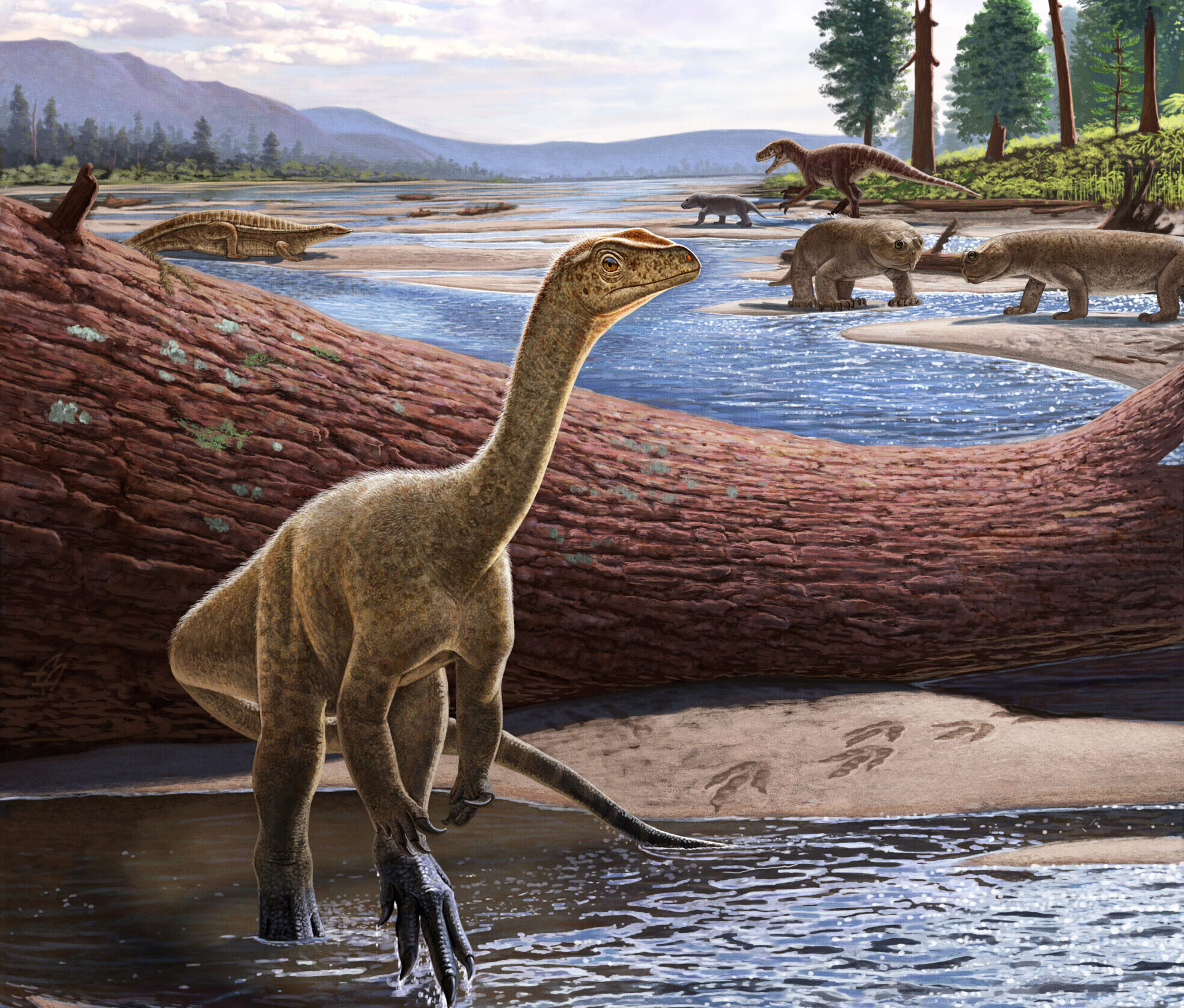

When looking at a map, the continents of South America and Africa look like they sort of fit together like puzzle pieces. This geographic symmetry is because the continents, and most of the land on Earth, were once fused together in a giant land mass called Pangea from about 200-300 million years ago. This ancient supercontinent influenced life on Earth during the Paleozoic and late Triassic periods. About 230 million years later, scientists have discovered Africa’s oldest dinosaur to date on the continent in Zimbabwe—and the nearly complete skeleton is now helping scientists better understand dinosaur evolution.
A nearly complete skeleton of Mbiresaurus raathi was discovered after five years, COVID-19 related delays, and extremely careful digging. Mbiresaurus lived along the banks of an ancient river in current day Zimbabwe, during the late Triassic period (about 252 million to 201 million years ago). The long-necked ancient lizard is a sauropodomorph, a relative of giant long-necked sauropods like Brachiosaurus and Apatosaurus. They were smaller than their late Jurassic to early Cretaceous counterparts, at about 6 feet long and 1.5 feet tall at the hip. By comparison, a later sauropod called Dreadnoughtus was about 85-feet-long.
According to the researchers, the Mbiresaurus was bipedal (stood on two legs), had a relatively small head, and it’s small, serrated, triangle-shaped teeth, suggesting that it was an herbivore or possibly omnivore.
“When we talk of the evolution of early dinosaurs, fossils from the Triassic age are rare,” said Darlington Munyikwa, the deputy director of National Museums and Monuments of Zimbabwe, who was part of the expeditions, in an interview with the BBC.
[Related: Were dinosaurs warm-blooded or cold-blooded? Maybe both.]
The findings were published yesterday in the journal Nature, and help answer why dinosaur fossils have only been found in some parts of Pangaea. Previously, the oldest known dinosaur specimens (dating back about 230 million years ago) were found in South America (specifically Argentina and Brazil), with a few partial specimens in India.
“The discovery of Mbiresaurus raathi fills in a critical geographic gap in the fossil record of the oldest dinosaurs and shows the power of hypothesis-driven fieldwork for testing predictions about the ancient past,” said primary author Christopher Griffin, who graduated in 2020 with a Ph.D. in geosciences from the Virginia Tech College of Science, in a press release. “These are Africa’s oldest-known definitive dinosaurs, roughly equivalent in age to the oldest dinosaurs found anywhere in the world.”
[Related: Move over, Stegosaurus, there’s a new armored dino in town.]
Griffin (now a postdoc at Yale University) Munyikwa, and Michel Zondo of the Natural History Museum of Zimbabwe in Bulawayo unearthed the nearly complete skeleton in the banks of the Cabora Bassa River Basin. In an interview with Science, Griffin recalled spotting what appeared to be a thigh bone sticking out of the river, “As soon as I dug that out, I knew that I was holding Africa’s oldest dinosaur,” said Griffin. “I had to sit down and breathe for a minute, because I thought, ‘There could be a lot more [bones] in there.’”
The new dinosaur received its name after Mbire, the the district in Zimbabwe where the skeleton was found and also is the name of an historic Shona dynasty that once ruled the region. The name “raathi” is in honor of Michael Raath, a paleontologist who first published the discovery of fossils in northern Zimbabwe.
